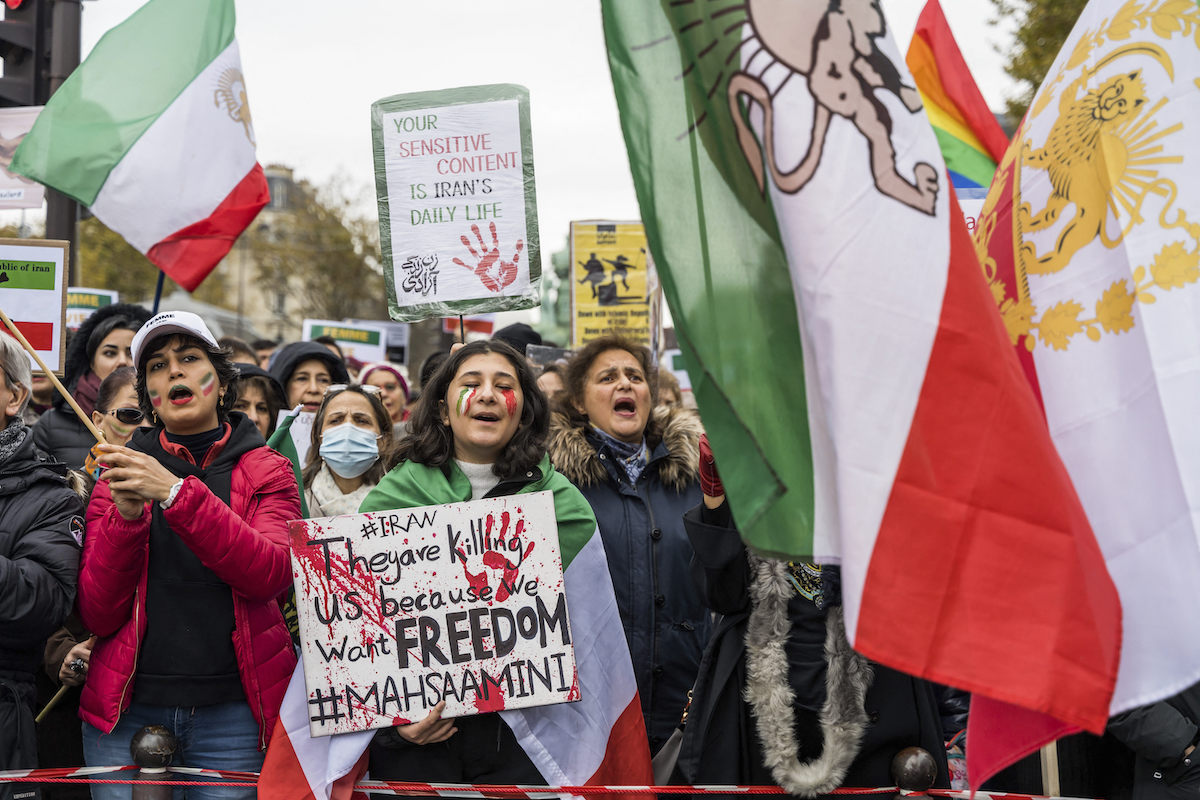The cruelty of the Iranian regime is on display daily. In July, Tehran initiated a crackdown on unveiled women, which two months later resulted in the death of Mahsa Amini, apparently from a police beating, and triggered mass protests across the country. They have now morphed into a broader movement to overthrow the more than four-decade-old political tyranny.
The opposition has attracted support from long-oppressed religious minorities. For instance, in October some 300 Iranian Christians released a letter criticizing the regime, which was, according to Lela Gilbert of Save the Persecuted Christians, “the first time the Christian community, not just women, men and women, has made a statement against the regime.”
Religious persecution is a foundation of the Islamic Republic. After taking power in 1953, Reza Shah Pahlavi simultaneously modernized and terrorized his nation. To the good, however, his regime promoted secular rule, separating the state from the dominant Shia Muslim faith. In 1975 his government ratified the International Covenant on Civil and Political Rights, which stated that “no one shall be subject to coercion which would impair his freedom to have or to adopt a religion or belief of his choice.”
A broad coalition subsequently drove him from power, but, tragically, an even worse tyranny soon succeeded him. Among the greatest victims were religious minorities. They continue to suffer vicious persecution.
For instance, at a hearing by the U.S. Commission on International Religious Freedom (USCIRF) last year, Ahmed Shaheed, the UN’s Special Rapporteur on Freedom of Religion or Belief, explained that
[Tehran] takes a proactive interest in preserving and propagation of its interpretations of Shia Islam. This endeavor often conflicts with a range of other obligations to protect human rights, including freedom of religion or belief for all persons. The Government applies high levels of restrictions on the rights of individuals that do not subscribe to the majority religion to secure and preserve this monopoly. It imposes a high degree of regulation of the institutions and associations of minority religions and enforces religious precepts of the State religion in law and State practices, with devastating consequences for religion or belief minorities and dissenters, and on women, girls and LGBTI+ persons.
Even under the supposedly more moderate government of President Hassan Rouhani, new restrictions were imposed on non-Shia Muslims. The latest USCIRF annual report offers these details: “Iran’s government also continued to arrest, charge, sentence, and jail scores of Christians on charges including ‘propaganda against the regime.’ Christian converts from Islam faced particular targeting for persecution.” Others subject to special abuse include Sufi and Sunni Muslims, Jews, Baha’is, and Yarsanis.
In July the commission issued an update with more bad news, noting:
Religious minorities who flee Iran continue to face threats to their safety from Iran’s Islamic Revolutionary Guard Corps (IRGC), and Iran continues its attempts to influence other governments in the Middle East to persecute religious minorities. Iran’s government also continues to use religion as a pretext for the repression of women, denying them individual freedom of religion or belief, and showing leniency on religious grounds toward perpetrators of so-called “honor killings.”
The regime enforces extremist interpretation and enforcement of Islamic doctrines and demonizes all but Shia Muslims. In a study of Iranian religious propaganda by Shahin Milani, executive director of the Iran Human Rights Documentation Center, USCIRF reported:
The Iranian government’s misinformation campaign against Iran’s religious minorities has continued in the last year, in tandem with the security apparatus’s efforts to stifle religious freedom inside the country. While the specific false accusations against each minority group are distinct, there are overarching themes in the government’s propaganda campaign against all. A common thread in the content published on religious minorities is their alleged ties to foreign states and their nefarious activities aimed at sowing discord and division within Iranian society. It is noteworthy that religious minority groups typically are not attacked for their religious beliefs per se. Instead, they are targeted on the pretext of posing threats to Iran’s sovereignty and security. This report provides examples of instances in which minority groups are depicted as posing national security threats as well as having anti-Iranian sentiment.
Unfortunately, the media is controlled by the Islamic regime. Some outlets are openly run by political leaders or institutions. Others are believed to be managed or funded by the government or official institutions. Nominally independent media sources rely on state subsidies and face official censorship. Noted the commission: “As such, there is no independent media outlet operating in Iran. In other words, the main difference between media outlets is the degree to which they are subject to state control.”
Unsurprisingly, anti-Semitism is also rife. Jews survive in Iran but are regularly vilified. The claims are sometimes unusual, “to some extent, different from more familiar tropes such as Jewish involvement in international conspiracies or nefarious actions of the state of Israel. Instead, it attacks Jews as having animosity against Persians from antiquity.”
Oddly, Christians are criticized for helping Zionism. Explained the USCIRF:
Propaganda against Christian converts is often disguised as anti-Zionism, and Christian converts are regularly referred to as members of a “Zionist” network. The reference to Zionism in this context does not refer to specific allegations of links between Christian converts in Iran and the state of Israel. Instead, it should be understood as describing a broad conspiracy in which evangelical Christians across the world promote political viewpoints that serve Zionist ideology.
Regarding Muslims, Iran is the mirror image of the Kingdom of Saudi Arabia, a country rated as having even less freedom than Iran and that persecutes Shiites. Tehran’s attacks on Sunnis are motivated by the latter’s supposed higher birth rates and outside support from the KSA. Indeed, “State propaganda against Sunnis is often shrouded in anti-Wahhabi discourse, implicating foreign conspiracies often involving Saudi Arabia.”
Bahá’ís are much abused, accused “of political influence and intrigue.” One claim: “The Bahá’ís were plotting to infiltrate Iran’s network of chess players through a chess club established by a Bahá’í who resides in the United States.” Seriously. Worse, presumably, are accusations that Bahá’ís are “cosmopolitan” and “believe that the United States is a just government and what the U.S. government and its people do always have humanitarian intentions.” This is treated as a serious crime rather than merely embarrassing naivete.
No sect is too small to attack. Gonabadi Dervishes were vilified for allegedly being “proponents of political violence” and “used as political pawns by foreign powers.” At least one video accused the Dervishes of “plotting against the Iranian government alongside the Bahá’ís.”
Iran is simply one of the world’s worst religious persecutors. The government and judiciary typically charge non-Shia religious believers with threatening national security. As implausible as the charges always are, they are typically backed by the most odious state propaganda possible.
Until now the Islamic regime has retained sufficient brute force to survive. However, the longer the protests run, the greater the likelihood that resistance will both intensify and broaden, undermining the entire system. The beating death of Mahsa Amini sparked the protests against the enforced wearing of the hijab and the extreme punishments inflicted on women who do not comply, but the intensity of the outrage also reflects more than four decades of intense religious discrimination and persecution. The end of Iran’s tyranny is long overdue.

